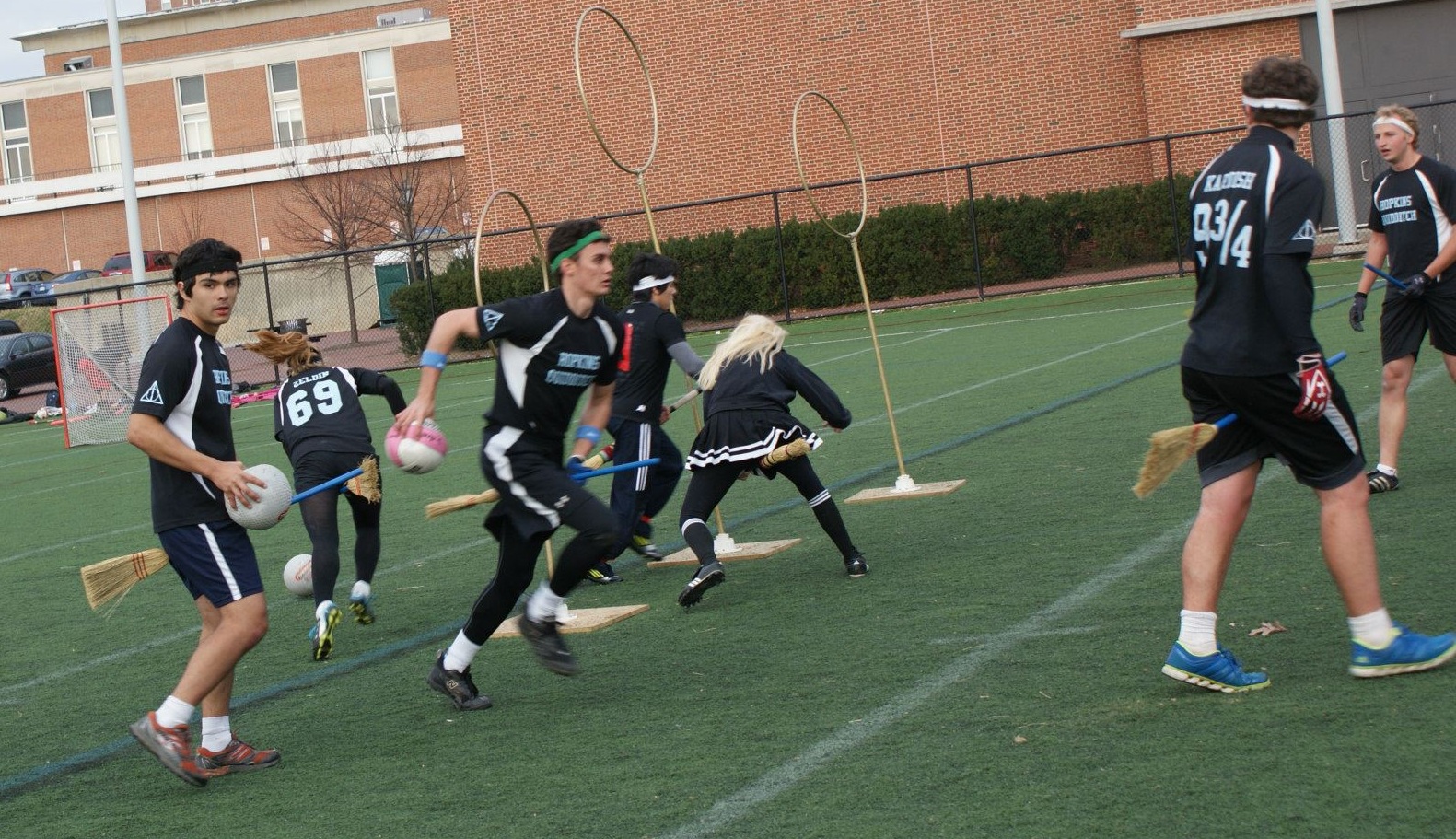- Rule, Britannia, no more?
- Unpopular Opinions: US Quadball Cup 2023
- Proven Contenders: University of Virginia
- Proven Contenders: Rutgers University
- Proven Contenders: University of Michigan
- Proven Contenders: Creighton University
- Different Perspectives: A Look Inside USA Ultimate
- Antwerp QC, Much of Belgian Core, Leaves Competitive Quidditch
Countdown to Kissimmee: Johns Hopkins University
- Updated: January 23, 2013

Johns Hopkins had climbed the Mid-Atlantic ranks on the back of a fast-break offense that gets them plenty of easy points. Credit: Johns Hopkins University Quidditch
In the months leading up to World Cup VI, the Eighth Man will be publishing a daily scouting report for one of the 60 teams that will be competing to become World Cup Champions. A full list of reports can be found here.
The Mid-Atlantic Region is known for its top four teams: Maryland, Villanova, Penn State and Pittsburgh. But just as Baylor has forced their way into the conversation in the Southwest, Johns Hopkins has begun to make waves on the regional and national scenes. With strong performances at many tournaments throughout the semester, Johns Hopkins went into regionals with high expectations, falling to Penn State 80*-40 in a tough quarterfinal match decided by a snitch grab. Does Johns Hopkins have what it takes to step up their game and impress in Kissimmee, or will they continue to struggle to break through from good to great? Here’s what we know:
Best Win: vs. No. 3 Villanova (120^*-100, Sept. 29)
Worst Loss: vs. University of Virginia (60*-50, Oct. 14)
Key Players: As has been pointed out in the past by many, including this website, Johns Hopkins offense runs through junior chaser Mike Matesich. One of the most overlooked players in the Mid-Atlantic, Matesich is both quick and strong, using his speedy first step to get the jump on most defenders. Matesich runs the fast break, something Hopkins excels at, with extreme fluidity. Unlike many teams’ best players, Matesich often plays off the ball when the team runs a slower offense. Matesich’s wide receiver hands and quick first step upon catching the ball ensure that if he can get even a little space, a good pass will often result in a beat defender and 10 points for Hopkins.
On the defensive side of things, Johns Hopkins looks to leader Audrey Zeldin, their veteran beater. Zeldin, a junior, is the team’s captain and a talented defensive player. She often anchors the team’s defense with her surprising unwillingness to give up her bludger. More important than her skill on the field, however, is her leadership off of it. Zeldin is the emotional leader of Hopkins, able to get her team ready and motivated for each and every game. It is impossible to go more than a minute watching a Johns Hopkins game without hearing her voice rise above the rest. Whether yelling support to a teammate or strategy tips to a player, Zeldin is always leading her team.
Player to Watch: One secret weapon waiting in the depths of Baltimore is former Marquette keeper Craig Ogurek. Ogurek played for the current Midwest Champions last season, but moved across the country for graduate school. In joining the Johns Hopkins team, Ogurek brings size, smarts and experience winning to a team in need of all those things. In addition, he brings a level head to an extremely emotional team. Ogurek is the all-around player who has the potential to push Hopkins over the top in important games.
Strategy: As described earlier, much of the offense of Johns Hopkins runs through Mike Matesich at the chaser position. The team is aggressive, and likes to get out and run when they can. When not possible, however, they often become impatient on offense. When they maintain composure in a half-field offense, they are capable of using quick cuts from in front and behind the hoops to free themselves up for passes. But when they lose their patience, they can be forced into making poor passes which result in quick, easy goals for their opponents.
With their bludger play, Johns Hopkins plays a very defensive game. They rarely send both beaters up the field, and always keep a bludger back on defense in an attempt to prevent against the fast break. With Alex Pressman and Ogurek at keeper, Hopkins also attempts to utilize their size on defense to stop their opponents in their tracks.
Strengths: Johns Hopkins will find success with patience and good passing. The team has some strong individual players who have the abilities to make plays, but they must be given the chance to do so. Their fast break is strong, but the team can’t rely entirely on the fast break with their limited defensive capabilities. The team can, however, rely on its strong beating to keep the score close if the offense isn’t able to excel.
Weaknesses: Because their defense is unorganized and has had little success this year, Hopkins loses many opportunities to take advantage of the fast break, one of the strongest facets of their game. When the pace is slowed down, Hopkins is at a huge disadvantage. They sometimes refuse to change their offense, resorting to long passes that are easily stopped once a team catches on. Many team members are very emotional and, when things begin to not go there way, become frustrated, compounding the problem.
Prediction: This Mid-Atlantic squad has a stringent practice and conditioning schedule and is getting better by the day. After challenging themselves this semester, I believe Johns Hopkins has enough to make it past Day 1. They will likely earn the third spot in their group (depending on the difficulty), and will make the final 32 teams. As of now, however, the team won’t be able to get much further unless they improve on some of their weak points.
